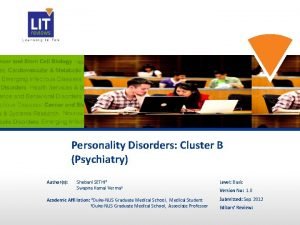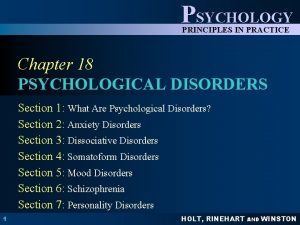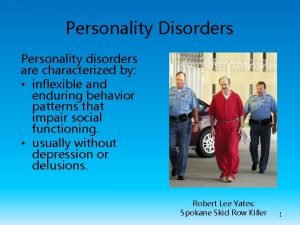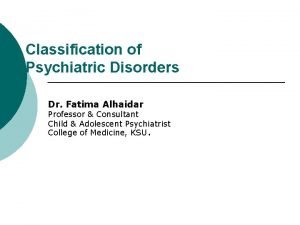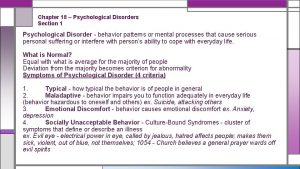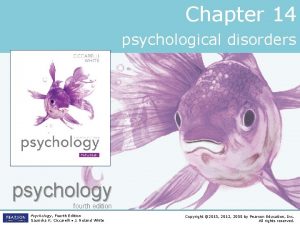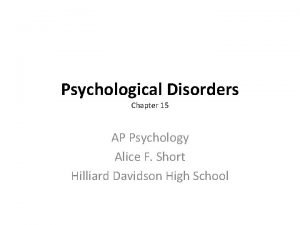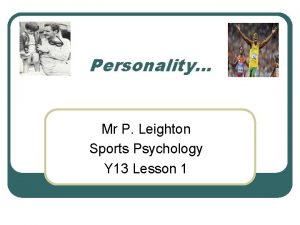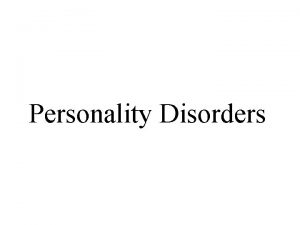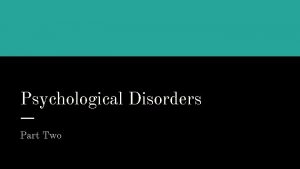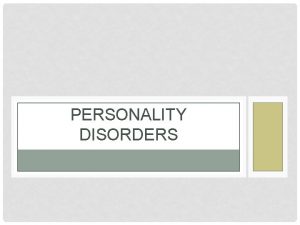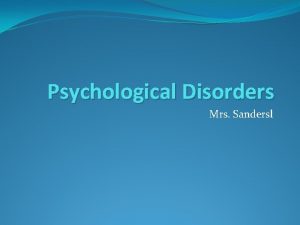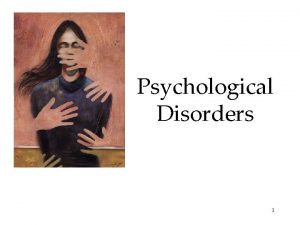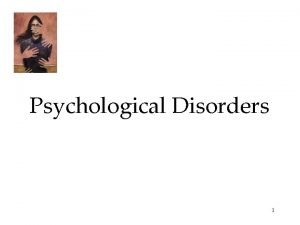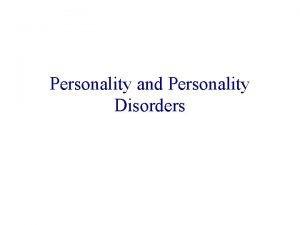PSYCHOLOGICAL DISORDERS 6 Personality Disorders Type Characteristics Personality









- Slides: 9

PSYCHOLOGICAL DISORDERS

6. Personality Disorders Type Characteristics Personality Disorder - patterns of inflexible traits that disrupt social life or work & distress the individual Four Types: a Paranoid Personality Disorder b Schizoid Personality Disorder c Antisocial Personality Disorder d Avoidant Personality Disorder Paranoid Suspiciousness and distrust about others’ motives Schizoid Detachment from social relationships schitzotypal Acute discomfort in close relationships, eccentricities of behavior Antisocial Disregard of the rights of others Borderline Instability in personal relationships & self image Histrionic Excessive emotionality, need for attention Narcissistic Grandiosity, need for admiration, lack of empathy Avoidant Social inhibition, feelings of inadequacy Dependent Submissive, clinging Obsessive. Compulsive Obsession w/orderliness, perfectionism, & control

a. Paranoid Personality Disorder a general distrust & suspiciousness of others, • doubts everyone • doesn’t confide w/others • holds grudges • b. Schizoid Personality Disorder • a lack of interest in relationships w/other people & lack normal emotional response

c. Antisocial Personality Disorder • Persistent antisocial pattern of disregard for, & violation of, the rights of others. • Don’t feel guilt or remorse & continue despite punishment & social rejection 1. Failure to conform to social norms 2. Deceitfulness 3. Impulsivity or failure to plan ahead 4. irritability and aggressiveness 5. Reckless disregard for the safety of self or others 6. irresponsibility. 7. Lack of remorse.

c. Antisocial Personality Disorder • Persistent antisocial pattern of disregard for, & violation of, the rights of others. • Don’t feel guilt or remorse & continue despite punishment & social rejection 1. Failure to conform to social norms 2. Deceitfulness 3. Impulsivity or failure to plan ahead 4. irritability and aggressiveness 5. Reckless disregard for the safety of self or others 6. irresponsibility. 7. Lack of remorse.

c. Antisocial Personality Disorder • Persistent antisocial pattern of disregard for, & violation of, the rights of others. • Don’t feel guilt or remorse & continue despite punishment & social rejection 1. Failure to conform to social norms 2. Deceitfulness 3. Impulsivity or failure to plan ahead 4. irritability and aggressiveness 5. Reckless disregard for the safety of self or others 6. irresponsibility. 7. Lack of remorse.

At least four of the following: A. Avoid activities that involves interpersonal contact. B. Avoids get involved due to a fear of not being liked by others. C. Restraint in intimate relationships due to a fear of shame or ridicule. D. Marked preoccupation of being rejected or criticized by others. E. Stay away from new interpersonal situations due to feelings of inadequacies. F. Views oneself as inferior, socially inept, or personally unappealing. G. Takes few if any personal risks in the engagement of new activities, for a fear of being embarrassed. d. Avoidant Personality Disorder: • people want relationships with others but can’t because they fear disapproval of others

Causes: Psychodynamic Explanation - no development of a conscience or superego. - Research shows children rejected and harshly punished tend to lack guilt. Learning theorists - Children are reinforced for bad behavior rather than good behavior Biological Heredity shows there is a link between relatives with the disorder, even with adopted subjects.

 Shebani sethi
Shebani sethi Chapter 18 psychological disorders review worksheet
Chapter 18 psychological disorders review worksheet Psychological disorders characterized by inflexible
Psychological disorders characterized by inflexible Psychological disorders
Psychological disorders Chapter 18 psychological disorders
Chapter 18 psychological disorders Chapter 14 psychological disorders
Chapter 14 psychological disorders Chapter 14 psychological disorders
Chapter 14 psychological disorders Bipolar
Bipolar Ap psychology chapter 15 psychological disorders
Ap psychology chapter 15 psychological disorders Type a and type b personality theory
Type a and type b personality theory
